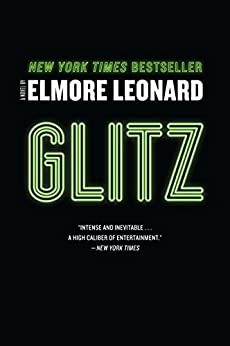Glitz by Elmore Leonard
Tags: crime-fiction, detective-fiction,
Elmore Leonard’s Glitz opens with Miami Beach detective Vincent Mora getting shot by a dopesick junkie in his way home from the grocery store. The bullet goes all the way through Mora, just missing his hip. After surgery and a brief hospital stay, the main character seems to disappear from the story.
We next find ourselves, inexplicably it seems, in San Juan, Puerto Rico, following an American tourist and the cabbie who has become his full-time chauffeur. The tourist is polite, generous and curious. He wants to see the city as a native. He takes a lot of photos. The cabbie is happy with his reliable, well-tipping fare, but the cabbie’s wife has a bad feeling about the pale-skinned American who seems to have taken a shine to a local prostitute named Iris Ruiz.

The cabbie figures he’ll do the tourist a favor. Find the prostitute his fare keeps photographing so he can introduce them.
And here we learn that the cabbie’s wife’s intuition was correct. Teddy Magyk is indeed bad news. Not a tourist, but a stalker. He doesn’t care for Iris one bit. His target is her fortyish American companion, Vincent Mora, the gimpy detective recovering from a gunshot wound. The man who sent him to prison for seven and half years on a rape charge.
Mora has been living in San Juan on short-term disability as he recovers from his gunshot wound. He’s been trying to straighten out young Iris, who suffers from a fatal combination of naivete, ambition and recklessness.
When Mora learns she’s been offered a job as a “hostess” in an Atlantic City casino, he visits the casino’s local San Juan operation to learn what exactly a “hostess” is expected to do.
This is where the plot get thick. The casino owner, Tommy Donovan, is a hapless womanizing lush who happened to be a real estate developer when Atlantic City legalized gambling. His wife lets him think he runs the operation. Mora understands as soon as he meets her that she’s running the show.
Mora also meets the manager of the casino’s day-to-day operations, Jackie Garbo, a fat, voluble, crotch-grabbing pig who is streetwise, cynical, deeply self-centered, and incredibly entertaining. While the reader cringes on first meeting Garbo, Mora actually goes out of his way to talk to the guy because there’s something deeply compelling about a guy who can speak direct truth in such a crass and selfish way.
Iris follows Jackie Garbo and the Donovans to their flagship casino in Atlantic City in pursuit of her American dream. She’ll start as the dutiful hostess, entertaining the high-rollers in their suites, and from there…
Who knows what her actual plan was. It didn’t work out. The cops found her on the sidewalk, eighteen floors below an apartment that hosted an illegal after-hours crapshoot for a Colombian drug lord. She wore only underpants, in which they found a folded envelope addressed to Vincent Mora.
How can Mora resist coming to Atlantic City when he gets the call from homicide?
He joins in an investigation that exposes the casino’s links to South American drug dealers and South Philly organized crime. Any one of the people in the apartment that night could have pushed Iris Ruiz to her death. The puzzling case brings Mora into contact with a number of colorful and dangerous characters.
What Mora doesn’t know, though the reader does, is that on his expulsion from Puerto Rick, Teddy Magyk, an Atlantic City native, wound up on the same flight as Iris Ruiz. If he couldn’t get to Mora, the next best thing was to get to someone Mora cared about, to lure the cop into his territory.
Magyk, we come to learn, is a true psychopath. Like most of Leonard criminals, he’s stupid. His particular brand of stupidity happens to be despicable, darkly funny, and terrifying.
On a fundamental level, all crime stories fall into a handful of patterns. There’s the whodunit, the police procedural, the revenge thriller. All of them focus on the battle between good and evil, and all hinge on the question of who will win the battle in this particular outing.
Leonard’s genius is in his telling and in the depth and color of his characters. He hooks you, keeps you guessing, and keeps developing three-dimensional characters where other authors put cardboard placeholders. He keeps you off balance. If the overall arc of the plot is predictable–we root for Mora and against Magyk–the unfolding is not.
We start every chapter wondering, “What’s going on here? What’s the significance? Who are these new characters?” The reader’s mind is always working as we read.
Leonard brings it all together slowly, bit by bit, in a satisfying and intelligent way. He’s a master of narrative, plot, dialog and character, and he really shows it in this one. This is one of the better outings from a writer whose work is always strong.